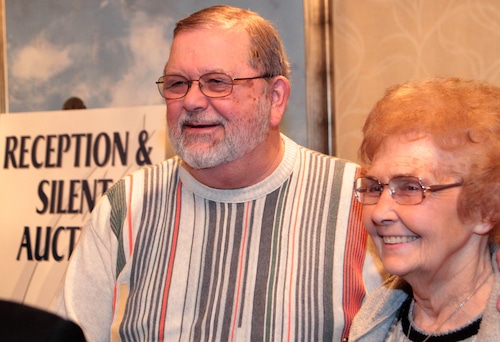CLEVELAND, Ohio – I received this email from Frank (not his real name):
“My wife was diagnosed with early-onset Alzheimer’s in 2017. She was only in her mid-50s. I took care of her at home alone for six years. The past two years she has been in a nursing home after suffering a seizure and stroke. I have been with Wendy for seven hours every day at the nursing home … ”
Frank had a lot more details about his story, but the key part is this question: When will this end?
You also can add this question: How will it end?
This isn’t only about Alzheimer’s. It’s about any type of long-term situation such as stroke, Parkinson’s disease, cancer, etc.
It’s when you are involved in something serious and there is no way to know how long it will last – or what impact it will have upon you.
I’ve been through a few long-term care situations and one of the hardest parts is not knowing.
In Frank’s case, he hears the word “dementia.” Then he hears “Alzheimer’s.” He can talk to doctors. He can read about it. But who knows how severe the condition will become and how to handle it?
John emailed me about how he took care of his wife with Alzheimer’s, and also ran a support group:
“One of my biggest disappointments is that for decades we have been spending hundreds and hundreds of millions of dollars trying to find the cause and a cure and are still not even close. People who are dealing with this on a daily basis get their hopes up when some ‘magical’ experimental drug shows up in the marketplace. Then, after a few months we learn it doesn’t work, and it’s back to the drawing board. It is so very painful for these families to go through.”
The same applies to other diseases. Desperate people hear about a new drug being tested. Or they are told of certain homeopathic cures. I like the idea of various vitamins and natural supplements to help deal with the symptoms of some conditions, but it’s cruel to market them as miracle drugs.
Who are the caregivers?
According to the Family Caregiver Alliance, “The ‘typical’ U.S. caregiver is a 46-year-old woman who works outside the home and spends more than 20 hours per week providing unpaid care to her mother. Most caregivers are married or living with a partner. While caregivers can be found across the age span, the majority of caregivers are middle-aged (35-64 years old).”
But the truth is they are men and women. I often hear from men in this situation, who are caring for their mothers or wives. Many caregivers are nearly as old as the person receiving the care.
“Many caregivers of older people are themselves elderly,” wrote the Family Caregiving Alliance. “Of those caring for someone aged 65 and older, the average age of caregivers is 63 years. One third of these caregivers are in fair to poor health.”
That’s because caregivers are in physical, emotional and spiritual battles. They often neglect their own health because the person they are caring for is in even worse condition.
When I visited a nursing home for several years, I met two men who were there after suffering major injuries taking care of their wives. One broke a hip, another shattered a knee. Both times, they were trying to help their wives get up after they had fallen down.
They often are exhausted.
 Joe and Jean Tait in 2012.Thomas Ondrey, The Plain DealerJoe Tait’s story
Joe and Jean Tait in 2012.Thomas Ondrey, The Plain DealerJoe Tait’s story
This story began with Frank’s email. He mentioned spending seven hours a day at the nursing home with his wife. Yes, he can do that. But I’d suggest cutting that time in half – and spending more time on his own health.
Former Cavs broadcaster Joe Tait endured a similar situation. His wife had Alzheimer’s. He kept her at home for years. He suffered knee problems and other injuries while trying to care for her.
After putting her in a memory care unit, he started spending most of the day with her. He was exhausted physically and mentally. He finally settled on going to dinner with her every night, spending a few hours that way.
Then Tait was hit with cancer and kidney problems. He died on March 10, 2021, at the age of 83. His wife died on March 1, 2023, at the age of 85.
“In the last few years, she didn’t know my name,” Tait told me. “Once in a while, I was ‘husband.’ Mostly, I was some guy who came to see her.”
Many of you can relate to that story.
The second-guessers
I believe there are two kinds of bravery. One is an instant decision, rescuing someone from a crisis – putting your life on the line.
The other is something that happens over months and years such as caregiving. It’s dealing with doubt: Do we have the best possible doctor? The proper medicine? The correct therapy?
The fact is we can make all the “right” decisions and things can still go wrong.
I know many people far more involved in caregiving than I have been. Some of them have had to deal with second-guessing from other family members.
I thank God that was never my experience in the three times I was medical power of attorney for someone who eventually passed away. But I have talked to many caregivers who have been hit with guilt trips from others on the sidelines. They have many opinions but don’t want the responsibilities.
My advice is, “Tell them to take over and hand them all the paperwork.”
That usually shuts them up.
The big battles
When I was dealing with my father’s stroke in the middle 1990s, it drove me to my knees. I had a lot of help, yet I was completely overwhelmed dealing with the medical and financial parts.
Often, I found myself living in Corinthians 5:7: “We walk by faith, not by sight.”
As one friend told me early when my father had his stroke, “Terry, don’t you get it? Life is hard. Either you go through it with God or without God. Take your choice.”
The Evil One will remind us of our mistakes when it comes to caregiving. We will encounter negative people who love to douse us in their misery. We must avoid them, even if it means cutting off what we once thought was a friendship.
According to the Caregiver Alliance, the average caregiving service lasts 4.3 years. Slightly less than 20% last at least 10 years.
I know some of you reading this are in this situation now, or have been there in the past. I want to write a follow up called “Tips for caregivers.” Please keep them short. I’ll use your first name. Put CAREGIVERS in the subject line and send them to terrypluto1234@gmail.com
.
If you purchase a product or register for an account through a link on our site, we may receive compensation. By using this site, you consent to our User Agreement and agree that your clicks, interactions, and personal information may be collected, recorded, and/or stored by us and social media and other third-party partners in accordance with our Privacy Policy.
